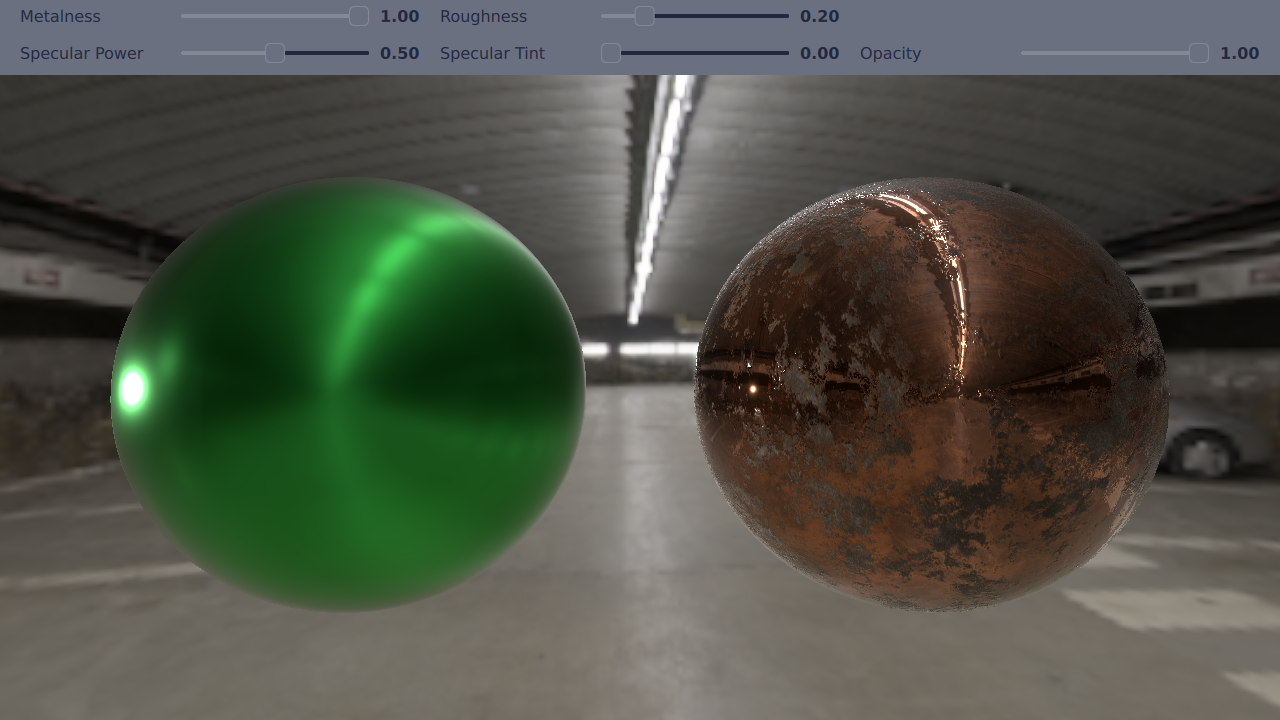Qt Quick 3D - Principled Material Example
Demonstrates the use of Principled Material.

This example demonstrates two different ways to use PrincipledMaterial in an application.
Setting Up the Scene
Light Probe
We specify a light probe, since we are using reflective metallic materials in the scene. We need to enable the light probe and adjust its settings to get the result we want.
environment: SceneEnvironment { clearColor: window.color backgroundMode: SceneEnvironment.SkyBox lightProbe: Texture { source: "maps/OpenfootageNET_garage-1024.hdr" } probeOrientation: Qt.vector3d(0, -90, 0) }
Rotating Light
Then we add DirectionalLight and add a rotation for it, to better demonstrate the effect that the metalness and roughness properties have on the materials.
// Rotate the light direction DirectionalLight { eulerRotation.y: -100 brightness: 1 SequentialAnimation on eulerRotation.y { loops: Animation.Infinite PropertyAnimation { duration: 5000 to: 360 from: 0 } } }
Principled Materials
Basic
We apply a basic principled material onto the sphere on the left. By this we mean a material that only uses the basic, numeric properties without any texture properties.
Model { position: Qt.vector3d(-250, -30, 0) scale: Qt.vector3d(4, 4, 4) source: "#Sphere" materials: [ PrincipledMaterial { baseColor: "#41cd52" metalness: materialCtrl.metalness roughness: materialCtrl.roughness specularAmount: materialCtrl.specular specularTint: materialCtrl.specularTint opacity: materialCtrl.opacityValue } ] }
Textured
We apply a textured principled material onto the sphere on the right.
Note: When using textures for metalness, roughness, bumpiness, and color, the basic property values are applied as multipliers for the values from the textures.
Model { position: Qt.vector3d(250, -30, 0) scale: Qt.vector3d(4, 4, 4) source: "#Sphere" materials: [ PrincipledMaterial { metalness: materialCtrl.metalness roughness: materialCtrl.roughness specularAmount: materialCtrl.specular opacity: materialCtrl.opacityValue baseColorMap: Texture { source: "maps/metallic/basecolor.jpg" } metalnessMap: Texture { source: "maps/metallic/metallic.jpg" } roughnessMap: Texture { source: "maps/metallic/roughness.jpg" } normalMap: Texture { source: "maps/metallic/normal.jpg" } metalnessChannel: Material.R roughnessChannel: Material.R } ]
Controlling the Property Values
There are sliders for adjusting the values of the different basic properties.
Note: If Metalness has a non-zero value, adjusting Specular Power or Specular Tint has no effect.
Files:
- principledmaterial/CMakeLists.txt
- principledmaterial/Example/MaterialControl.qml
- principledmaterial/Example/main.qml
- principledmaterial/Example/qmldir
- principledmaterial/MaterialControl.qml
- principledmaterial/main.cpp
- principledmaterial/main.qml
- principledmaterial/materials.qrc
- principledmaterial/principledmaterial.pro
- principledmaterial/qml.qrc
Images:
- principledmaterial/Example/maps/metallic/basecolor.jpg
- principledmaterial/Example/maps/metallic/metallic.jpg
- principledmaterial/Example/maps/metallic/normal.jpg
- principledmaterial/Example/maps/metallic/roughness.jpg
- principledmaterial/maps/metallic/basecolor.jpg
- principledmaterial/maps/metallic/metallic.jpg
- principledmaterial/maps/metallic/normal.jpg
- principledmaterial/maps/metallic/roughness.jpg